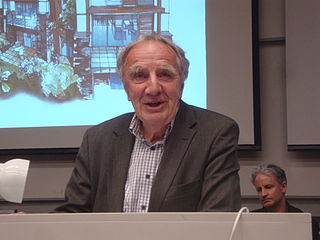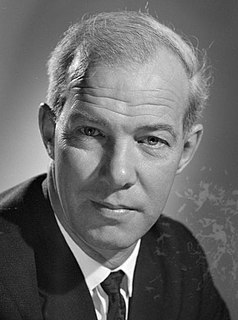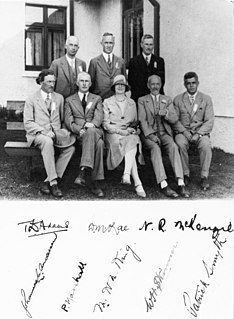Related Research Articles

Margaret Elizabeth Austin is a former New Zealand politician. She was an MP from 1984 to 1996, representing first the Labour Party and then briefly United New Zealand.

Sir Frederick Miles Warren is a New Zealand architect. He apprenticed under Cecil Wood before studying architecture at the University of Auckland, eventually working at the London County Council where he was exposed to British New Brutalism. Upon returning to Christchurch, and forming the practice Warren and Mahoney, he was instrumental in developing the "Christchurch School" of architecture, an intersection between the truth-to-materials and structural expression that characterised Brutalism, and the low-key, Scandinavian and Japanese commitment to "straightforwardness". He retired from Warren and Mahoney in 1994 but continues to consult as an architect and maintain his historic home and garden at Ohinetahi.
Brian Newton Davis was the Anglican Bishop of Waikato from 1980 to 1986 and Archbishop and Primate of New Zealand and Bishop of Wellington from 1986 to 1997.

Tessa Duder is a New Zealand author of novels for young people, short stories, plays and non-fiction, and a former swimmer who won a silver medal for her country at the 1958 British Empire and Commonwealth Games. As a writer, she is primarily known for her Alex quartet and long-term advocacy for New Zealand children's literature. As an editor, she has also published a number of anthologies.
The Human Rights Commission is the national human rights institution (NHRI) for New Zealand. It operates as an independent Crown entity, and is independent from direction by the Cabinet.
Dame Jean Marjory Herbison was a New Zealand academic, educator, researcher and Chancellor of the University of Canterbury. She was the first woman to hold the post of chancellor at a New Zealand university.

Phillip Albert Amos was a New Zealand politician of the Labour Party.
Harry Delamere Barter Dansey was a New Zealand Māori journalist, cartoonist, writer, broadcaster, local politician, and race relations conciliator.

Duncan McFadyen Rae was a New Zealand politician of the National Party.
John Hubert Macey Rodgers was a Missionary bishop. He was Vicar Apostolic of Tonga and Niue (1953–1966) Bishop of Tonga (1966–1973) then Bishop of Rarotonga (1973–1977), Auxiliary Bishop of Auckland (1977–1985), Superior of the Mission, Funafuti, Tuvalu (1986).

Guy Hardy Scholefield was a New Zealand journalist, historian, archivist, librarian and editor, known primarily as the compiler of the 1940 version of the Dictionary of New Zealand Biography.
The 2009 Special Honours in New Zealand were announced in August 2009 as a result of the reinstatement of the appellations of "Sir" and "Dame" to the New Zealand Royal Honours System by passing Special Regulation 2009/90 Additional Statutes of The New Zealand Order of Merit, a legally binding regulation with the force of law in New Zealand.
The 1951 King's Birthday Honours in New Zealand, celebrating the official birthday of King George VI, were appointments made by the King on the advice of the New Zealand government to various orders and honours to reward and highlight good works by New Zealanders. They were announced on 7 June 1951.
Edward Te Rangihiwinui Tauroa, known as Hiwi Tauroa, was a New Zealand rugby union player and coach, school principal, and civil servant of Māori descent.
The 1958 Queen's Birthday Honours in New Zealand, celebrating the official birthday of Elizabeth II, were appointments made by the Queen on the advice of the New Zealand government to various orders and honours to reward and highlight good works by New Zealanders. They were announced on 12 June 1958.
The 1981 Queen's Birthday Honours in New Zealand, celebrating the official birthday of Elizabeth II, were appointments made by the Queen in her right as Queen of New Zealand, on the advice of the New Zealand government, to various orders and honours to reward and highlight good works by New Zealanders. They were announced on 13 June 1981.
The 1990 New Year Honours in New Zealand were appointments by Elizabeth II on the advice of the New Zealand government to various orders and honours to reward and highlight good works by New Zealanders. The awards celebrated the passing of 1989 and the beginning of 1990, and were announced on 30 December 1989.
The 1976 Queen's Birthday Honours in New Zealand, celebrating the official birthday of Elizabeth II, were appointments made by the Queen on the advice of the New Zealand government to various orders and honours to reward and highlight good works by New Zealanders. They were announced on 12 June 1976.
The 1986 New Year Honours in New Zealand were appointments by Elizabeth II on the advice of the New Zealand government to various orders and honours to reward and highlight good works by New Zealanders. The awards celebrated the passing of 1985 and the beginning of 1986, and were announced on 31 December 1985.
The 1989 New Year Honours in New Zealand were appointments by Elizabeth II on the advice of the New Zealand government to various orders and honours to reward and highlight good works by New Zealanders. The awards celebrated the passing of 1988 and the beginning of 1989, and were announced on 31 December 1988.
References
- 1 2 3 4 5 6 Lambert, Max; Traue, James Edward; Taylor, Alister (1991). Who's Who in New Zealand, 1991 (12th ed.). Auckland: Octopus. p. 289. ISBN 9780790001302.
- 1 2 "Wally Hirsh," LIMMUD NZ 2018. Retrieved 27 December 2021.
- ↑ "New Year honours 1990" (PDF). New Zealand Gazette (10). 26 January 1990. pp. 267–270.